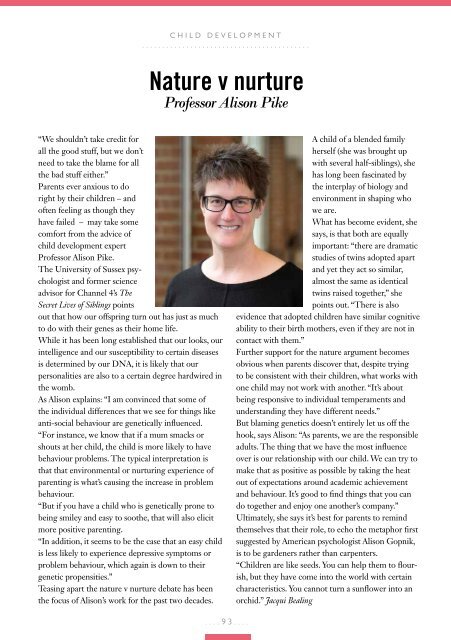Viva Brighton Issue #58 December 2017
You also want an ePaper? Increase the reach of your titles
YUMPU automatically turns print PDFs into web optimized ePapers that Google loves.
CHILD DEVELOPMENT<br />
..........................................<br />
Nature v nurture<br />
Professor Alison Pike<br />
“We shouldn’t take credit for<br />
all the good stuff, but we don’t<br />
need to take the blame for all<br />
the bad stuff either.”<br />
Parents ever anxious to do<br />
right by their children – and<br />
often feeling as though they<br />
have failed – may take some<br />
comfort from the advice of<br />
child development expert<br />
Professor Alison Pike.<br />
The University of Sussex psychologist<br />
and former science<br />
advisor for Channel 4’s The<br />
Secret Lives of Siblings points<br />
out that how our offspring turn out has just as much<br />
to do with their genes as their home life.<br />
While it has been long established that our looks, our<br />
intelligence and our susceptibility to certain diseases<br />
is determined by our DNA, it is likely that our<br />
personalities are also to a certain degree hardwired in<br />
the womb.<br />
As Alison explains: “I am convinced that some of<br />
the individual differences that we see for things like<br />
anti-social behaviour are genetically influenced.<br />
“For instance, we know that if a mum smacks or<br />
shouts at her child, the child is more likely to have<br />
behaviour problems. The typical interpretation is<br />
that that environmental or nurturing experience of<br />
parenting is what’s causing the increase in problem<br />
behaviour.<br />
“But if you have a child who is genetically prone to<br />
being smiley and easy to soothe, that will also elicit<br />
more positive parenting.<br />
“In addition, it seems to be the case that an easy child<br />
is less likely to experience depressive symptoms or<br />
problem behaviour, which again is down to their<br />
genetic propensities.”<br />
Teasing apart the nature v nurture debate has been<br />
the focus of Alison’s work for the past two decades.<br />
A child of a blended family<br />
herself (she was brought up<br />
with several half-siblings), she<br />
has long been fascinated by<br />
the interplay of biology and<br />
environment in shaping who<br />
we are.<br />
What has become evident, she<br />
says, is that both are equally<br />
important: “there are dramatic<br />
studies of twins adopted apart<br />
and yet they act so similar,<br />
almost the same as identical<br />
twins raised together,” she<br />
points out. “There is also<br />
evidence that adopted children have similar cognitive<br />
ability to their birth mothers, even if they are not in<br />
contact with them.”<br />
Further support for the nature argument becomes<br />
obvious when parents discover that, despite trying<br />
to be consistent with their children, what works with<br />
one child may not work with another. “It’s about<br />
being responsive to individual temperaments and<br />
understanding they have different needs.”<br />
But blaming genetics doesn’t entirely let us off the<br />
hook, says Alison: “As parents, we are the responsible<br />
adults. The thing that we have the most influence<br />
over is our relationship with our child. We can try to<br />
make that as positive as possible by taking the heat<br />
out of expectations around academic achievement<br />
and behaviour. It’s good to find things that you can<br />
do together and enjoy one another’s company.”<br />
Ultimately, she says it’s best for parents to remind<br />
themselves that their role, to echo the metaphor first<br />
suggested by American psychologist Alison Gopnik,<br />
is to be gardeners rather than carpenters.<br />
“Children are like seeds. You can help them to flourish,<br />
but they have come into the world with certain<br />
characteristics. You cannot turn a sunflower into an<br />
orchid.” Jacqui Bealing<br />
....93....


















